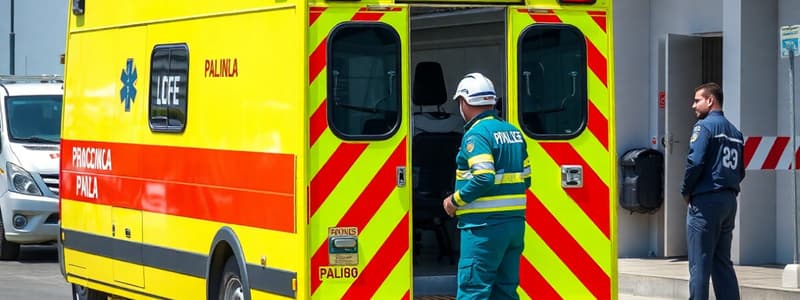Podcast
Questions and Answers
How does understanding legal responsibilities primarily benefit paramedics in their profession?
How does understanding legal responsibilities primarily benefit paramedics in their profession?
- By enabling them to provide legal advice to patients, expanding their role.
- By helping them avoid legal issues that could impair their professional capabilities. (correct)
- By allowing them to use legal knowledge to influence hospital administration policies.
- By guaranteeing promotions and salary increases within their organization.
Which of the following reflects the most direct impact of legal knowledge on a paramedic's ethical conduct?
Which of the following reflects the most direct impact of legal knowledge on a paramedic's ethical conduct?
- It fosters a deeper understanding of appropriate professional behavior, promoting quality patient care and positive workplace relationships. (correct)
- It ensures paramedics always agree with hospital lawyers, maintaining facility compliance.
- It allows paramedics to aggressively advocate for patients, even if it means bending workplace rules.
- It eliminates all personal ethical dilemmas by providing clear legal precedents for every situation.
Which of the following situations is most directly governed by general law?
Which of the following situations is most directly governed by general law?
- A dispute between two neighbors over property lines.
- A lawsuit alleging that a government environmental agency failed to enforce pollution standards. (correct)
- A patient suing a doctor for medical malpractice.
- A contract dispute between a private hospital and a medical supply company.
If a paramedic is accused of violating a statute related to the improper handling of controlled substances, under which category of law would this case most likely fall?
If a paramedic is accused of violating a statute related to the improper handling of controlled substances, under which category of law would this case most likely fall?
An agency responsible for regulating healthcare facilities is operating outside the scope of its defined authority. Which type of law would most directly address and challenge this overreach?
An agency responsible for regulating healthcare facilities is operating outside the scope of its defined authority. Which type of law would most directly address and challenge this overreach?
Which scenario best illustrates the role of law in resolving disputes within a society?
Which scenario best illustrates the role of law in resolving disputes within a society?
A paramedic is called to a scene where an individual is refusing medical assistance. How does understanding the law and legal systems specifically benefit the paramedic in this situation?
A paramedic is called to a scene where an individual is refusing medical assistance. How does understanding the law and legal systems specifically benefit the paramedic in this situation?
In the context of the provided text and the role of law, how do laws primarily influence the interactions between individuals, organizations, and the government?
In the context of the provided text and the role of law, how do laws primarily influence the interactions between individuals, organizations, and the government?
Which of the following best describes the consequence of a community failing to establish and enforce laws?
Which of the following best describes the consequence of a community failing to establish and enforce laws?
A new regulation is proposed that seems to contradict existing laws. What would be the BEST approach to determine its legitimacy?
A new regulation is proposed that seems to contradict existing laws. What would be the BEST approach to determine its legitimacy?
Flashcards
Legal Awareness Benefits
Legal Awareness Benefits
Awareness of legal responsibilities, practice limits, and ethical behavior in healthcare.
General Law
General Law
Laws covering administration, constitutional issues, and criminal acts.
Private Law
Private Law
Organizes rights and duties between individuals and organizations.
General Law Function
General Law Function
Signup and view all the flashcards
Constitutional Law
Constitutional Law
Signup and view all the flashcards
What is a Law?
What is a Law?
Signup and view all the flashcards
Purpose of Laws
Purpose of Laws
Signup and view all the flashcards
Role of Laws
Role of Laws
Signup and view all the flashcards
Scope of Laws
Scope of Laws
Signup and view all the flashcards
Why Paramedics Need Law Knowledge
Why Paramedics Need Law Knowledge
Signup and view all the flashcards
Study Notes
- The lesson introduces the legal system, focusing on an introduction to law, ethics, and professionalism within the context of Emergency Health Sciences (EHS).
- The primary learning outcome is to explain the legal status and requirements of medical care in the United Arab Emirates (UAE).
Definition of Law
- Law is defined as a rule of conduct and a system of regulations or processes recognized as binding and enforced by a legitimate authority.
- Laws are principles that help individuals in a society resolve disputes and problems without resorting to force.
- Laws govern relationships between individuals, organizations, and the government.
- They clarify duties, obligations, and rights within a society, ensuring people understand what is expected of them and what they can expect from others.
- Governments enact laws to maintain societal function and control behaviors that could jeopardize public safety.
Importance of Understanding Law for Paramedics
- Familiarizes paramedics with relevant legal vocabulary, concepts, and the structure of the law.
- Equips them with knowledge of their legal responsibilities to avoid legal issues that could affect their careers.
- Helps paramedics understand the limits of their practice and the implications of their actions.
- Protects paramedics, patients, coworkers, and facilities.
- Promotes ethical behavior in patient care within the workplace, encouraging high professional standards.
Areas of Law: General Law and Private Law
- General law covers administrative, constitutional, and criminal acts.
- Private law governs the rights and duties between private individuals and organizations, with civil law as a primary subdivision.
- Criminal and civil laws are the laws most relevant to healthcare practitioners.
General Law Subdivisions
- General law governs the powers of the government and public authorities and the actions between individuals and the government.
- Constitutional law derives from a country's constitution.
- Administrative law governs the functions, organization, and powers of government administrative agencies and controls their operations.
- Criminal law addresses offenses against a country or its sovereignty, punishing behavior that harms individuals or public interests.
- Police bring criminal cases to court on behalf of the state's citizens.
- A crime has been committed when: the action is considered an offense, and there was an intention to carry out the act.
- Types of crimes include: felony and misdemeanor.
- A felony is a crime punishable by death or imprisonment for more than one year.
- Examples include abuse, illegal drug dealing, murder, practicing medicine without a license, fraud, mayhem, and rape.
- A misdemeanor is a less serious crime, punishable by fines or imprisonment for less than one year.
- Examples include traffic violations, petty theft, and disturbing the peace.
- Criminal law aims to maintain justice, public order, safety, and individual protection by punishing offenders.
- Punishments aim to deter future crime and rehabilitate criminals.
Private Law Subdivision
- Seeks to recognize and enforce the rights and duties of private individuals and organizations.
- Civil law defines the rights and duties of individuals and private entities in their relationships.
- Under civil law, individuals or entities can sue others. Civil disputes often involve: contract violations, slander, libel, trespassing, product liability, or auto accidents.
- Civil cases often involve family matters such as divorce, and child custody.
- Judgments in such case usually require the payment of money to the injured party.
- In civil law, the person who brings the case is the 'Plantiff' and the other party is the 'Respondent'.
- The two basic subdivisions of liability in Civil Law include Tort and Contract.
- A Tort action is a wrongful civil action which lead to loss. It can result in legal liability.
- A contract is a legally bonding agreement of the rights and duties to the parties involved in the case.
Sources of Law
- Origins of laws, referring to the sovereign or authority from which law derives its validity.
- The Constitution sets out the powers and functions of government branches and fundamental principles.
- Legislation generally takes priority over other sources of law apart from the Constitution.
- Judicial decisions can evolve into case law.
Sources of Law in the UAE
- According to Article 7 of the UAE Constitution (1971, amended through 2009), Islamic Sharia is the main source of legislation.
- The laws of the Constitution lay down the structure for the judiciary and courts.
- UAE legislation is a mixture of Islamic Sharia laws and civil laws.
Islamic Sharia Law
- Islamic law is embodied in the Sharia, an Arabic word meaning "the right path".
- Sharia governs all aspects of a Muslim's life:
- The Holy Qu'ran is considered the principal source as it has the word of Allah.
- The Sunnah are the verbal teachings of Prophet Mohammed.
- Agreement among religious scholars regarding solutions to matters not covered in the Koran or the Sunnah. It is called Al Ijma.
- Al Qiyas is used in the absence of a clear decision and drawn in line with previously cited sources of law.
Legal Systems
- Legal systems are processes or procedures for interpreting, enforcing, and applying the law.
- It provides a systematic and orderly method for resolving disagreements.
- Two Types: Common Law System and Civil Law System.
Legal Systems Cont...
Common Law System
- Consists of principles evolved from judicial decisions of courts.
- Judicial decisions are binding.
- Common law court reviews past decisions of similar courts to make a decision.
- The United States of America and England apply common law jurisdictions.
- Common law is not recognized/adopted in the UAE.
Civil Law System
- Places less emphasis on court precedent than other law systems.
- Civil law relies on federal laws and constitutions.
- In a civil law system, a judge establishes facts and bases judgements on codified laws.
- Civil law system has been adopted by the UAE.
Studying That Suits You
Use AI to generate personalized quizzes and flashcards to suit your learning preferences.




